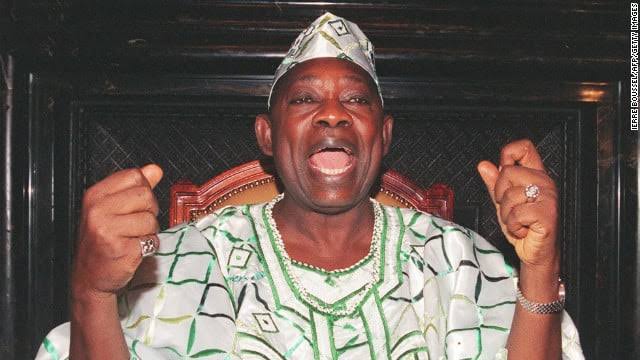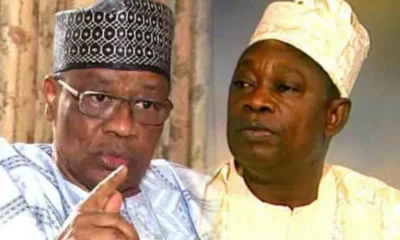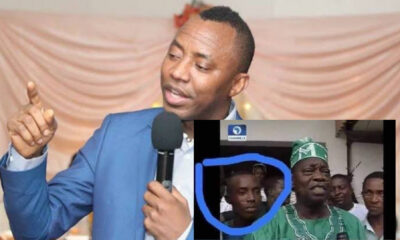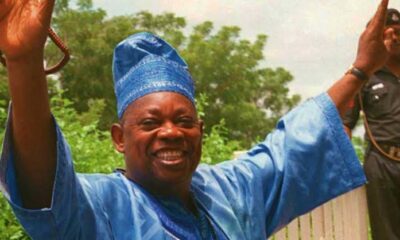Inside Nigeria
What Babangida’s revelation about my father means – Abiola’s son

Abdulmumuni Abiola is the son of the winner of the June 12, 1993, presidential election, Moshood Kashimawo Abiola, better known as MKO. In this interview, Abdulmumuni discusses how he feels about Former military Head of State, General Ibrahim Babangida, acknowledging that the candidate of the Social Democratic Party, SDP, MKO Abiola, won the poll. Excerpts:
How do you feel about Former military Head of State, Ibrahim Babangida, statement that your dad, Moshood Abiola, won the June 12, 1993, presidential election?
In the revelations that we heard from the former Head of State, on Thursday, there were two parts for me. The first part was the acknowledgment that Abiola, my father, had won the 1993 elections. For me, I already knew that. From the young age of eight when the elections were held, I knew my father had won the elections even before they were announced. I think most people in the country had that inclination that Abiola had won the elections. The second part was more important for me, the acknowledgment that he was remorseful for the actions that he had taken at the time, and also his expression that if he had the opportunity to do it again, he would have taken a different path. That’s what matters now.
I think it is important that we understand that we are human, and it is human to err, and what we need to do is acknowledge when we make those mistakes and seek forgiveness. For me, I think that was more important to hear the fact that he expressed that remorse towards the decision that he made. Like I said, the June 12, 1993, election was won by my father, and I knew this, and most Nigerians knew it too.
I think it was also good because once he announced it, he had put the matter to rest. We can talk about Abiola as the figurehead of the June 12 struggle, but what we need to understand is that the Nigerian people were the ones who gave him that mandate, and they were the ones who believed in his vision. This is also healing for the Nigerian people to hear the head of state at the time say those words.
Was this healing for you? Was this healing for your siblings?
I would say, when we look at the events of June 12, 1993, it brings up a lot of emotions for me. I remember after the election was annulled my father struggled to get his mandate, struggled to get justice for what he assumed was the wrongful annulment of that election. He got arrested and eventually lost his life. At the time when he was arrested, my mum had come out and tried to get him released and ended up losing her life. I think I know what was lost. I lost a companion, my mother. I lost a guardian. I lost a protector.
I basically became an orphan based on that event or that era. My father was one to always turn the other cheek. My religion talks about forgiveness, not necessarily for the perpetrator’s sake, but for your sake, so you can actually move on. I think that this was traumatic for the Abiola family, but it was also traumatic for the Nigerian people as well. You mentioned some of your colleagues, their experiences around that time and how they were so afraid. It was uncertain.
The future was uncertain for a bunch of Nigerians. We lost a lot of great Nigerian people who felt that Nigeria was not redeemable, and they left the country. There was a lot of brain drain at that period as well. I know that there is a lot of trauma that has come out. I do not think that there will be anything that can be said or done to alleviate that stress.
What I have tried to do in my life and in moving forward, especially as you can’t change the past, but we can only focus on the future, I have tried to not dwell on it. I have acknowledged what happened in the past but not dwell on it and just try to see how I can use this anger, hurt and frustration in a way that is productive and move the nation forward. I think we can all sit here and talk about all the things that have gone wrong, but we have a nation to run, and we have issues that are pertinent at this time. I think my father was, yes, a messenger, but he also had a message, and I think the message is still an enduring one now. I think we need to understand that with everything that has happened, we thank Allah for His blessings and His guidance.
What I try to do is not, like I said, dwell on the past but focus on more of what I can control, and that is the future and where we are going. My father had a vision and a passion for this country, and I think it is important that their sacrifice is not in vain. I cannot keep discussing my father’s sacrifice all the time, especially knowing that he had a vision. He had a hope for a better Nigeria, and I can use that energy in a more productive way of realising that dream for him.
Yes, my father wanted something, and he made promises, which he couldn’t keep. I think it is up to his children and those who believed in what he stood for to push that agenda. I think that’s the way I would go about it. Also pushing out his agenda, we are also alleviating some of the pains that other Nigerians went through. Democracy is not a destination, it is a journey. And I am willing to commit myself, and I am hoping other Nigerians are also willing to commit themselves to this Nigerian project.
What do you expect from President Bola Tinubu now that Babangida has said Abiola won the elections and tendered his apology?
He was also a champion of this democracy that we have today, and he was a key member of the struggle. As you are aware, he was also in exile, just like I had to go on exile. I think that it is important that in moving forward, I do not think I should have any expectations.
Buhari has acknowledged my father, and I applauded him when he did that. He acknowledged my father’s role. He named June 12th Democracy Day. I think the head of state who was in charge of the government at the time now acknowledged that Abiola won the election, and it was free and fair, and released the results as he did. I think at this point, it doesn’t really have anything to do with me.
At this point, it is not what I want or what I expect. The state’s organs need to spring into action.
He is now a father of the nation, a former president of the country, and I don’t know what the procedure is, but I know that there are things that should be done to, first of all, secure his legacy, protect his estate.
Abdulmumuni Abiola is the son of the winner of the June 12, 1993, presidential election, Moshood Kashimawo Abiola, better known as MKO. In this interview, Abdulmumuni discusses how he feels about Former military Head of State, General Ibrahim Babangida, acknowledging that the candidate of the Social Democratic Party, SDP, MKO Abiola, won the poll. Excerpts:
How do you feel about Former military Head of State, Ibrahim Babangida, statement that your dad, Moshood Abiola, won the June 12, 1993, presidential election?
In the revelations that we heard from the former Head of State, on Thursday, there were two parts for me. The first part was the acknowledgment that Abiola, my father, had won the 1993 elections. For me, I already knew that. From the young age of eight when the elections were held, I knew my father had won the elections even before they were announced. I think most people in the country had that inclination that Abiola had won the elections. The second part was more important for me, the acknowledgment that he was remorseful for the actions that he had taken at the time, and also his expression that if he had the opportunity to do it again, he would have taken a different path. That’s what matters now.
I think it is important that we understand that we are human, and it is human to err, and what we need to do is acknowledge when we make those mistakes and seek forgiveness. For me, I think that was more important to hear the fact that he expressed that remorse towards the decision that he made. Like I said, the June 12, 1993, election was won by my father, and I knew this, and most Nigerians knew it too.
I think it was also good because once he announced it, he had put the matter to rest. We can talk about Abiola as the figurehead of the June 12 struggle, but what we need to understand is that the Nigerian people were the ones who gave him that mandate, and they were the ones who believed in his vision. This is also healing for the Nigerian people to hear the head of state at the time say those words.
Was this healing for you? Was this healing for your siblings?
I would say, when we look at the events of June 12, 1993, it brings up a lot of emotions for me. I remember after the election was annulled my father struggled to get his mandate, struggled to get justice for what he assumed was the wrongful annulment of that election. He got arrested and eventually lost his life. At the time when he was arrested, my mum had come out and tried to get him released and ended up losing her life. I think I know what was lost. I lost a companion, my mother. I lost a guardian. I lost a protector.
I basically became an orphan based on that event or that era. My father was one to always turn the other cheek. My religion talks about forgiveness, not necessarily for the perpetrator’s sake, but for your sake, so you can actually move on. I think that this was traumatic for the Abiola family, but it was also traumatic for the Nigerian people as well. You mentioned some of your colleagues, their experiences around that time and how they were so afraid. It was uncertain.
The future was uncertain for a bunch of Nigerians. We lost a lot of great Nigerian people who felt that Nigeria was not redeemable, and they left the country. There was a lot of brain drain at that period as well. I know that there is a lot of trauma that has come out. I do not think that there will be anything that can be said or done to alleviate that stress.
What I have tried to do in my life and in moving forward, especially as you can’t change the past, but we can only focus on the future, I have tried to not dwell on it. I have acknowledged what happened in the past but not dwell on it and just try to see how I can use this anger, hurt and frustration in a way that is productive and move the nation forward. I think we can all sit here and talk about all the things that have gone wrong, but we have a nation to run, and we have issues that are pertinent at this time. I think my father was, yes, a messenger, but he also had a message, and I think the message is still an enduring one now. I think we need to understand that with everything that has happened, we thank Allah for His blessings and His guidance.
What I try to do is not, like I said, dwell on the past but focus on more of what I can control, and that is the future and where we are going. My father had a vision and a passion for this country, and I think it is important that their sacrifice is not in vain. I cannot keep discussing my father’s sacrifice all the time, especially knowing that he had a vision. He had a hope for a better Nigeria, and I can use that energy in a more productive way of realising that dream for him.
Yes, my father wanted something, and he made promises, which he couldn’t keep. I think it is up to his children and those who believed in what he stood for to push that agenda. I think that’s the way I would go about it. Also pushing out his agenda, we are also alleviating some of the pains that other Nigerians went through. Democracy is not a destination, it is a journey. And I am willing to commit myself, and I am hoping other Nigerians are also willing to commit themselves to this Nigerian project.
What do you expect from President Bola Tinubu now that Babangida has said Abiola won the elections and tendered his apology?
He was also a champion of this democracy that we have today, and he was a key member of the struggle. As you are aware, he was also in exile, just like I had to go on exile. I think that it is important that in moving forward, I do not think I should have any expectations.
Buhari has acknowledged my father, and I applauded him when he did that. He acknowledged my father’s role. He named June 12th Democracy Day. I think the head of state who was in charge of the government at the time now acknowledged that Abiola won the election, and it was free and fair, and released the results as he did. I think at this point, it doesn’t really have anything to do with me.
At this point, it is not what I want or what I expect. The state’s organs need to spring into action.
He is now a father of the nation, a former president of the country, and I don’t know what the procedure is, but I know that there are things that should be done to, first of all, secure his legacy, protect his estate.
Like I said, the loss of the late Chief Abiola was devastating for the whole family. You know, at the point of him being incarcerated, most of his businesses were targeted and deliberately and strategically destroyed. It created some kind of fracture. It divided the whole family. We were all pushed into different directions.Like I said, the loss of the late Chief Abiola was devastating for the whole family. You know, at the point of him being incarcerated, most of his businesses were targeted and deliberately and strategically destroyed. It created some kind of fracture. It divided the whole family. We were all pushed into different directions.


























